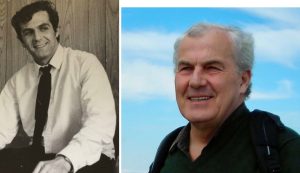
Two photos of Anthony (Tony) Lancaster
Anthony (Tony) Lancaster, died on December 10, 2022 at HopeHealth Hulitar Hospice Center in Providence, Rhode Island, with his family by his side. Jane, Clare, Tom and Rob shared the ten-day vigil at the hospice. He was 84 years old.
Tony was born in Eccles, near Manchester, England, on June 25, 1938. He failed his eleven-plus, an exam for entry to a selective school, but passed at twelve, after coaching paid for by his grandfather. Having missed the first year at King George V Grammar School, he spent the next four years at the bottom of the C-stream. His time and energy went into snooker (he was Southport Junior Champion at fourteen) and the Air Training Corps. To everyone’s surprise he did remarkably well in his mock GCEs (General Certificate of Education), so a young English master encouraged him to stay into the Sixth form. Unable to think of a better alternative, he did so.
He also did well in his Advanced Level exams, and went to Liverpool University, where he gained first class honors in Economics. He then attended St. Catharine’s College, Cambridge, and completed his PhD in 1964. After a year in Dublin he took a job at Birmingham University, where he met Jane.
In 1973 he was hired by Hull University as a full professor, and he soon became department chair. After thirteen happy years in a tall Georgian house in Beverley, Yorkshire, he became part of the 1980s “brain drain” and moved to Brown University, an Ivy League college in Providence, Rhode Island. He later became department chair there, too.
In 1991 he was honored to be named a Fellow of the Econometric Society.
In addition to Brown, he held visiting positions at Harvard University, the Australian National University, the Indian Statistical Institute, the University of Wisconsin–Madison, the University of Washington, Cornell, Stanford, UCLA, and UCSD.
He loved poetry, bird watching, Manchester United football club, cricket, and Beverley. A great lover of travel, in later years he combined this with his love of cricket by attending Test Matches around the world, including in Australia, the West Indies, South Africa and Sri Lanka.
He is survived by Jane, his wife of 55 years, his daughter Clare and her sons Jack and Matt, and her granddaughters Stella and Bonnie—whom he got to meet a few weeks after their births, and a few months before his death—his son Tom, his wife Chang and children Alison, Daniel and Oscar, and his son Rob, his wife Devon and children Emery and Jake.
He is also survived by his “academic children,” the scholars whom he mentored at the University of Birmingham, the University of Hull, and Brown University. These include, among others, Andrew Chesher, Guido Imbens who went on to win the Sveriges Riksbank Prize in Economic Sciences in honor of Alfred Nobel in 2021, Wilbert van der Klaauw (he brought these two young Dutchmen with him from Hull to Brown), Orna Intrator, Tiemen Woutersen and Peter Hansen.
Tony specialized in econometrics and wrote many seminal papers in duration analysis. His 1979 paper, “Econometric methods for the duration of unemployment” (Econometrica: Journal of the Econometric Society, 939–956) is a classic that introduced duration analysis to the econometrics discipline. He later wrote a monograph, The Econometric Analysis of Transition Data (1990, Cambridge University Press), that became the standard text in the area. Among his other highly cited papers the discussion of the incidental parameter problem in 2000, “The incidental parameter problem since 1948” (Journal of Econometrics, 95(2), 391–413) stands out. His writing was characterized by clarity and its focus on insights rather than technical obscurities, an art he tried to instill with great patience in all his students.
In the words of one of his many collaborators, “Tony showed me the value of pursuing research that leads to real progress in understanding human behavior, and that this is much more rewarding and important than following the fashion and trend.”
Tony’s colleagues in the Economics Department at Brown remember the major role he played in establishing and nurturing the field of econometrics at the University. He is also remembered for being a thoughtful and calming presence in the department. These were qualities that stood him in good stead when he served as department chair from 1999 to 2002.
He will be missed by all of his families, his friends and colleagues.
—
Written by Guido Imbens, Stanford University